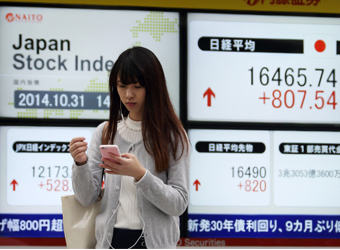Japanese shares jumped more than 2 percent on Wednesday as the yen weakened against a stronger dollar and recent surveys suggest global manufacturing sectors might be seeing a strong turnaround.
The Nikkei 225 leaped 2.32 percent while the Topix bounced up 2.28 percent, driven by a weaker yen after the greenback hit a 14-year high overnight against a basket of currencies and a stronger-than-expected manufacturing survey.
The final Nikkei Japan manufacturing Purchasing Managers Index (PMI) rose to 52.4 in December, beating a preliminary reading of 51.9 and November’s 51.3. A figure above 50 represents expansion in a sector, while a reading below 50 indicates contraction.
The private survey indicates Japan’s manufacturing sector is seeing signs of recovery, with increased domestic and global demand. It follows an upbeat China’s Caixin manufacturing PMI on Tuesday to its best since January 2013, aiding regional sentiment.
“The weak yen and buoyant regional PMIs/ISM were reasons for optimism about Japanese exporters,” Vishnu Varathan, head of economics and strategy of Asia and Oceania Treasury Department at Mizuho Bank, told CNBC.
There are more signs that global manufacturing sectors might be recovering strongly, with surveys showing positive readings not just in the U.S. China and Japan, but also in the U.K.
On Tuesday, the Markit/CIPS UK Manufacturing PMI rose to 56.1, its strongest reading since June 2014, and a jump from 53.6 in November.
Major Japanese exporters were all sharply higher, particularly automakers, because the weaker yen would increase the value of profits earned overseas when it is repatriated and make Japanese exports cheaper for foreign buyers.
Toyota was up 3.01 percent, while Honda advanced 4.16 percent. Takata rallied 17.5 percent or 150 yen at 1,007 yen per share, to hit its daily price limit. The airbag maker had gained 65 percent or 400 yen per share since last Wednesday, when news broke that the company could settle U.S. criminal charges by next month related to faulty equipment.
Electronics giant Sharp was up 8.89 percent to 293 yen per share, after jumping as high as 10.3 percent at two-year highs, after news that it plans to co-build a 61 billion yuan ($8.8 billion) factory in China with Hon Hai Precision Industry to produce liquid-crystal displays. Shares of Hon Hai were up 0.24 percent to 84.40 Taiwanese dollars.
Earlier, Toshiba plunged as low as 6.9 percent to 263.5 yen each share at the open after Asahi Shimbun reported a Japanese security watchdog suspects the company padded profits by 40 billion yen in the past three years, Reuters reported.
Shares of the Japanese conglomerate recovered from earlier losses to trade down 1.34 percent at 273.1 yen in an extremely volatile session. The stock has fallen nearly 37 percent or 19.6 yen each since last Dec. 26.
Last week, Toshiba said it may have to book several billion dollars in one-off charges related to a U.S. nuclear power plant construction company acquisition.
Chinese shares gained on Wednesday, with the Shanghai composite up 0.41 percent, while the Shenzhen composite adding 0.811 percent.
In Hong Kong, the Hang Seng index was down 0.08 percent.
Hong Kong-listed casino stocks were mostly lower, with Wynn Macau down 1.14 percent, Sands China slipping 0.6 percent and Galaxy Entertainment down 0.3 percent, except for Melco International Development which was up 1.57 percent.
The People’s Bank of China’s (PBOC) latest reporting framework for financial institutions on “large sum” and “suspicious” transactions will come into effect from July onward, and is the latest in a series of capital controls to control yuan outflows. The move is expected to weigh on sentiment for Macau’s gaming sector and its widely-expected growth trajectory in 2017, said analysts at Daiwa Capital Markets, in a note on Tuesday.
Australia’s ASX 200 wavered between negative and positive for most of the session to close down 0.03 percent or 1.6 points at 5,731.6.
South Korea’s Kospi was nearly flat, up 0.05 percent, after South Korea’s finance minister said the economy’s recovery momentum will likely slow this year, and its time for fiscal policy to play a more active role to boost growth, Reuters reported.
The country is also in the midst of a months-long political scandal, with President Park Geun-hye refusing to testify on Tuesday in the impeachment trial that is set to determine her future, after denying charges of wrongdoing over the weekend.
In currency markets, the dollar index was tracking 103.31 by afternoon in Asia, after it surged to a 14-year high at 103.82 on Tuesday supported by a two-year high read on the December ISM manufacturing index, at 54.7.
Against the greenback, the yen continued to weaken for the fifth straight session, at 118.02, while the Australian dollar was tracking $0.724.
Over in the U.S., the Dow Jones industrial average closed up 0.6 percent at 19,881.76, the S&P 500 finished up 0.85 percent at 2,257.83 and the Nasdaq composite gained 0.37 percent, to close at 5,429.08.
Crude prices recovered from overnight losses in spite of continued dollar strength, with U.S. crude up 0.71 percent to $52.70 per barrel in Asian trade, and global benchmark Brent up 0.69 percent to $55.85.
Oil prices dropped more than 2 percent on Tuesday in the U.S. as the dollar surged to a 14-year high. A stronger dollar may weigh on commodities, which are dollar-denominated, making it more expensive in other currencies.
Source: CNBC


